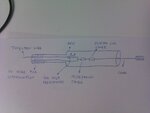grega_primc
Newbie level 5

Hey,
I am working with plasma and deal with measuring plasma particle densities. We use simple electric or Langmuir probes, which we put into plasma to measure the current picked up by the probe. The probe is then connected to the oscilloscope, where we measure current through voltage.
Plasma is created with an RF generator operating usually at frequency 13.56 MHz. And the probe in the plasma reacts as an antenna picking up lots of 13.56 and 27.12 MHz signals, which spoiles the probe charasteristics.
I will try to use chokes, to cut off these two frequencies where the coax cable of the probe begins. The problem is that I don't know the impedance of plasma, because it changes when using different excitation powers or gas pressure or..., and the plasma impedance cannot be determined. The probe impedance is always the same and it is around 10 Ω, but then again the probe is all the time coupled to the plasma.
Have any suggestions?
Thanks,
Regards
I am working with plasma and deal with measuring plasma particle densities. We use simple electric or Langmuir probes, which we put into plasma to measure the current picked up by the probe. The probe is then connected to the oscilloscope, where we measure current through voltage.
Plasma is created with an RF generator operating usually at frequency 13.56 MHz. And the probe in the plasma reacts as an antenna picking up lots of 13.56 and 27.12 MHz signals, which spoiles the probe charasteristics.
I will try to use chokes, to cut off these two frequencies where the coax cable of the probe begins. The problem is that I don't know the impedance of plasma, because it changes when using different excitation powers or gas pressure or..., and the plasma impedance cannot be determined. The probe impedance is always the same and it is around 10 Ω, but then again the probe is all the time coupled to the plasma.
Have any suggestions?
Thanks,
Regards







